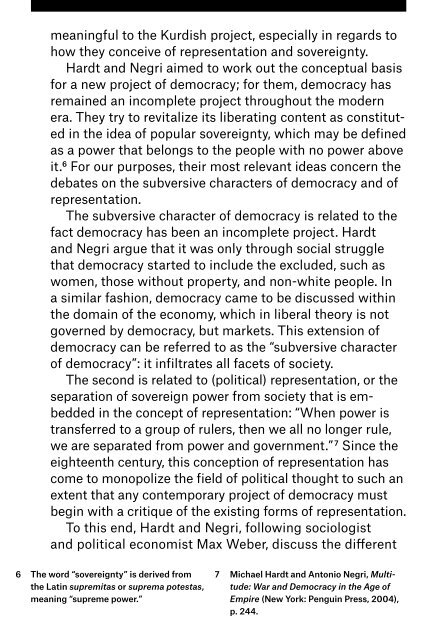Stateless Democracy
NWA5-Stateless-Democracy1.pdf?utm_content=buffer7beda&utm_medium=social&utm_source=twitter
NWA5-Stateless-Democracy1.pdf?utm_content=buffer7beda&utm_medium=social&utm_source=twitter
Create successful ePaper yourself
Turn your PDF publications into a flip-book with our unique Google optimized e-Paper software.
meaningful to the Kurdish project, especially in regards to<br />
how they conceive of representation and sovereignty.<br />
Hardt and Negri aimed to work out the conceptual basis<br />
for a new project of democracy; for them, democracy has<br />
remained an incomplete project throughout the modern<br />
era. They try to revitalize its liberating content as constituted<br />
in the idea of popular sovereignty, which may be defined<br />
as a power that belongs to the people with no power above<br />
it. 6 For our purposes, their most relevant ideas concern the<br />
debates on the subversive characters of democracy and of<br />
representation.<br />
The subversive character of democracy is related to the<br />
fact democracy has been an incomplete project. Hardt<br />
and Negri argue that it was only through social struggle<br />
that democracy started to include the excluded, such as<br />
women, those without property, and non-white people. In<br />
a similar fashion, democracy came to be discussed within<br />
the domain of the economy, which in liberal theory is not<br />
governed by democracy, but markets. This extension of<br />
democracy can be referred to as the “subversive character<br />
of democracy”: it infiltrates all facets of society.<br />
The second is related to (political) representation, or the<br />
separation of sovereign power from society that is embedded<br />
in the concept of representation: “When power is<br />
transferred to a group of rulers, then we all no longer rule,<br />
we are separated from power and government.” 7 Since the<br />
eighteenth century, this conception of representation has<br />
come to monopolize the field of political thought to such an<br />
extent that any contemporary project of democracy must<br />
begin with a critique of the existing forms of representation.<br />
To this end, Hardt and Negri, following sociologist<br />
and political economist Max Weber, discuss the different<br />
6 The word “sovereignty” is derived from<br />
the Latin supremitas or suprema potestas,<br />
meaning “supreme power.”<br />
7 Michael Hardt and Antonio Negri, Multitude:<br />
War and <strong>Democracy</strong> in the Age of<br />
Empire (New York: Penguin Press, 2004),<br />
p. 244.<br />
forms of representation that have appeared throughout<br />
history. 8 Referring to the socialist political representation,<br />
based mostly on the experience of the 1871 Paris<br />
Commune, Hardt and Negri state it failed in a manner<br />
similar to the liberal and constitutional model. Thus,<br />
they set about a search for new forms of representation<br />
that limit the separation between the representative and<br />
the represented, and in so doing, simultaneously create<br />
alternatives for the state based on the separation of sovereign<br />
power from society. In this sense, they claim that<br />
the multitude as the “revolutionary subject” of the period<br />
and its political project (commonwealth) can present new<br />
contingencies for inventing “different forms of representation<br />
or new forms of democracy that go beyond representation.”<br />
9 Constitutive of this new concept of democracy,<br />
the multitude is conceptually distinguished from other<br />
notions, such as “the people,” “the masses,” and “the<br />
working class,” and can never be reduced to a unity or a<br />
single identity. Rather, “in conceptual terms, the multitude<br />
replaces the contradictory couple identity-difference with<br />
the complementary couple commonality-singularity” 10<br />
and it is “the adequate subject which can construct a<br />
new community.” 11<br />
8 Hardt and Negri distinguish three forms<br />
of representation: appropriated, free,<br />
and instructed representation. Appropriated<br />
representation has the weakest link<br />
and the strongest separation between<br />
representatives and represented. The<br />
representatives are not selected, appointed,<br />
or controlled but interpret the<br />
will and interest of the represented. In<br />
free representation, the represented have<br />
a connection with the representatives,<br />
but their control is limited, for example,<br />
by means of temporal election. The third<br />
form, instructed representation, is one in<br />
which the representatives are bound to<br />
the instructions of the represented.<br />
9 Hardt and Negri, Multitude, p. 255.<br />
10 Ibid., p. 218. By singularity, Hardt and<br />
Negri mean “a social subject whose difference<br />
cannot be reduced to sameness, a<br />
difference that remains different” and, for<br />
them, “the multitude is composed of a set<br />
of singularities.” In Ibid., p. 99.<br />
11 Çiğdem Çıdam, “Antonio Negri’s Radical<br />
Critique of Contemporary Capitalism:<br />
Invoking Love, Revolutionizing Politics and<br />
Theorizing <strong>Democracy</strong>,” paper presented<br />
at the Annual Meeting of Political Science<br />
Association in Washington DC, 1–4 September<br />
2010.<br />
164–165


